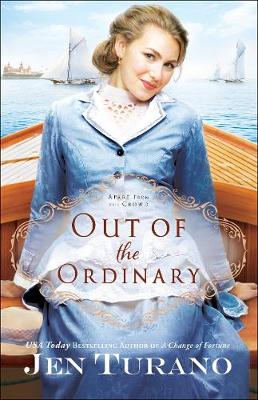Harrison was great. He was considered "most eligible bachelor" despite his interesting fashion choices. He was obviously color-blind, but also had a penchant for mixing stripes and plaids and was known to wear trousers that had clovers all over them. He read his sisters' romance novels in secret, hoping to better understand women through them, and with humorous results.
Gertrude was mostly just kind-hearted and generous. She cheerfully endured her employer's fashion experiments despite the fact they often resulted in disaster, such as the time she was forced to endure a partial bird cage converted into a bustle. Really. :-)
I loved the scene where Gertrude and Harrison were running away from his sister and "sneaking" off the yacht. Harrison's actions and motivations for them had me laughing. I don't want to spoil it, so I'll just leave it at that.
Some quotes I liked enough to note here:
God doesn't expect His children to live ordinary lives, but extraordinary ones
I think you may have just insulted me
What good is having long lashes if I never get to bat them?
I also loved the use of some fun words and phrases that you don't get to hear every day. For example: skullduggery, thwarting, wallflowers, and last prayers.
There were a few things that bothered me about the book. Not enough that I don't recommend it, but I did want to point them out. The intention here is not to be critical, but constructive. Remember, I gave the book 4 stars despite these things. :-)
Overall the book was humorous, but there were some serious topics that were brought up. The circumstances surrounding Gertrude becoming an orphan were extreme as was her employer, Mrs. Davenport's, past. The contrast between the humorous and the serious parts was almost enough that it felt like the author couldn't make up her mind what kind of tone the story was supposed to have. The combination of madcap and maudlin was awkward.
I appreciated the message about forgiveness and how it extends to everyone, and the way that it was brought home was well done. However, mentions of God and other Christian themes were very lightly scattered throughout the story, so where they appeared, it felt a little contrived and almost like they were placed there as a second thought. Like the tone of the book, I felt that more consistent mentions of God and Gertrude's struggles would have made the story stronger.
This is a very minor thing, but there was a scene where the ladies were at a hotel and had changed into their bathing costumes in their room and then donned capes and headed through the hotel to go to the beach. I haven't researched this, so I could be wrong, but wasn't that why they had those bathing huts - so the changing of clothes could be done in modesty and then the ladies could go right outside the hut into the water mostly unseen by anyone else? It seemed like it would have been very inappropriate for them to walk through the hotel in such a state of "undress" as that.
And finally, this was an advance reader copy so it is possible corrections were made after the copy I received, but I did notice errors in the book that were distracting. One example is the term "short shrift", which was used quite a bit, primarily to indicate that things were done quickly, however that term means "rapid and unsympathetic dismissal; curt treatment" or "little time between condemnation and execution or punishment" which wasn't appropriate for the context in the story.
This review was originally posted on Among the Reads
I received this book for free from Bethany House Publishers in exchange for an honest review. This does not affect my opinion of the book or the content of my review.

